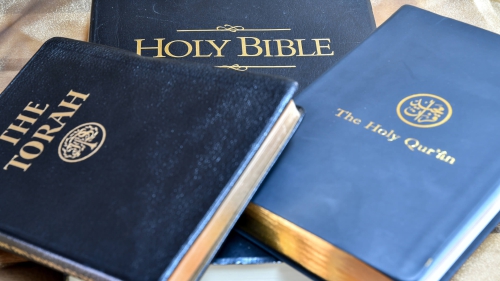Islam and Pluralism in a Global Era

That human beings are all different cannot be argued. Physically and psychologically no two human beings, however closely related biologically, are exactly the same. In addition to racial and ethnic differences, there are the acquired differences in ideas, knowledge approaches, priorities and judgment, among many other differences, that accrue from the surrounding culture.
Religion belongs somewhere between an inherited and an acquired difference, that is, it can be inherited by succeeding generations from an earlier one, or it can develop from one's contemplation into personal conviction. The fact that religious faith is most commonly inherited collectively rather than developed individually makes the acceptance of religious diversity essential for the well-being of humanity.
A nation-state, even the most harmonious geographic entity, displays diversity in race, ethnicity and religions, as well as acquired ideological and political notions that reflect natural differences in thinking and judgment. Since the world is coming closer together as a result of miraculous developments in the technology of transportation and communication, global diversity has become a fact that has to be accepted intellectually and morally, and secured and sanctioned legally, by all groups throughout the world.
Pluralism is the institutional form that acceptance of diversity takes in a particular society or in the world as a whole. It means something more than moral tolerance or passive coexistence. Tolerance is a matter of individual feeling and behavior and coexistence is a mere acceptance of others that does not go beyond an absence of conflict. Pluralism, on the one hand, requires organizational and legal measures that secure and sanction equality and develop fraternity among all human beings as individuals or groups, whether their differences are inborn or acquired. Pluralism also requires a serious approach towards understanding the other and a constructive cooperation for the betterment of the whole. All human beings should enjoy equal rights and opportunities, and all should fulfill equal obligations as citizens of a nation and of the world. Each group should have the right to organize and develop itself and to maintain its identity and interests, and each should enjoy equality of rights and obligations in the state and in the world.
Pluralism means that minority groups can participate fully and equally with the majority in the society, and yet maintain their particular identity and differences. This particular has to be maintained by the state and the law, first by national law and eventually by international law. Pluralism originally referred only to ethnic and religious differences, but in a democracy ideological and political differences also came to be subsumed under the same term, on the philosophical grounds that there in no single understanding of the truth and thus a variety of beliefs and institutions and com- munities should exist together and enjoy equal legitimacy. Relations should be constructive, whatever the beliefs of a particular group may be regarding the sole and universal truth. The "Encyclopedia Britannica" includes under pluralism both natural- born and acquired differences. Its definition is: "Autonomy enjoyed by disparate groups within a society: such groups as religious groups, trade unions, professional organizations or ethnic minorities." It may be preferable to replace "autonomy" with "the right to maintain a common identity and interests."
Muslims, like adherents of other religions of the world, have to live with non-Muslims within a given country. Muslim citizens of the country can have their ethnic or doctrinal differences with-in themselves or with other Muslims in the world. Muslim unity does not require that Muslims form a single state; even the caliphate always comprised different beliefs and ethnicities. Where one lives may be dictated by geographic or economic factors. A nation-state can be considered from the Islamic point of view as an enlarged family or an enlarged neighborhood, each with its own special interests that in no way detract from the universal relations of togetherness and solidarity required by Islam. Divisions into peoples and other groups with common origin, are acknowledged in the Quran (49:13), and nothing is wrong with it so long as such divisions do not hinder universal human relations and cooperation, and are not abused through chauvinistic arrogance and aggression. The Quran indicated that God and his teachings should be put above any allegiance to a particular group or land, and so long as this principle is observed, allegiance to one's family and to particular human gatherings and to one's homeland is recognized (9:24). As Muslims live in larger groups and in lands where they can prosper, they have to live with other religions and sects Moreover, contemporary globalism is creating unavoidable interdependence among all humankind, whatever their natural-born or acquired differences may be.
For a long time consensus was regarded as important because the goal was to achieve uniformity in beliefs and human values.
"Aquinas in the Middle Ages," as Nicholas Rescher writes, Regarded consensus on fundamentals as a condition assured by God: Kant in the 18th century considered it as something rooted in the very nature of Reason; Hegel in the 19th century saw it as guar- anteed by the spirit of cultivation working through the march of history ever enlarging its hold on human society; Habermas in the 20th century sees is as inherent in the very nature of communications as an indispensables social praxis. By contrast, many present-day writers invest social consensus not with confidence, but with hope.
Rescher argues that abandonment of consensus is impossible, and defends pluralism in cognitive and social theory against dogmatic uniformity, and indicating that in the face of differing views, it is still appropriate to take a committed and definite position. Pluralism should not allow people to fall into the trap of "relativistic indifferentism." He emphasizes that, if natural and ration- al diversity cannot be escaped, "a sensibly managed social system should be so designed that a general harmony of constructive interaction can prevail despite diversity.. [and] that different can be accommodated short of conflict This requires acquiescence in difference ... and respect for the autonomy of other." 1
Given that "the truth is one," one might think that reaching the truth would automatically produce consensus, but Rescher underlines the problem of connecting the truth to consensus by reversing the question, asking if we achieve consensus, can we be sure concerning the truth about which the consensus has been achieved? As he rightfully says, "The appeal of a consensus approach to truth is easy to understand. But its workability is something else." He reaches the conclusion that "consensus is thus no highway to truth, and no substitute for an objective criteriology," although it may be a useful epistemological instrument. Rescher calls attention to the fact that "the realization of a consensus among inquiries requires extraordinarily unusual conditions - conditions of a special and particular sort which are not in general met in the difficult circumstances of an imperfect world." Thus, "The empirical basis of our factual knowledge is bound to engender a variety of cognitive positions through the variation of experience here on earth." Accordingly, Rescher emphasizes: "the pluralism that a sensible empiricism engenders in the light of such variable experiential conditions is rationally justified. The unavailability of consensus and the inescability of pluralism are realities of the life of reason.
Such an inevitable cognitive pluralism should not, however, be construed as encouraging indifference, nor should it put the faith of any believer at risk, since "one can certainly combine a relativistic pluralism of possible alternatives with a monistic position regarding ideal rationality and a firm and reasoned commitment to the standards intrinsic of one's own position. ' 2
Political pluralism holds that power and authority should not be monopolized by a single group, order, or organization, and that all citizens should be allowed to compete legitimately or to cooperate. If pluralism is unavoidably determined in cognitive matters, it is more essential when it comes to natural-born differences. Pluralism in religion recognizes the multiplicity of religious groups, and the rights of belief, expression, assembly, and legit mate activity for every individual, for each religious group within the group and for the group as a whole. Unless human under- standing and cooperation supersede both inborn and acquired differences, "holocausts" and "ethnic cleansings" will continue, and on a global scale will breed either ceaseless conflict or self- imposed isolation. Multiethnic countries may always face the horrors of civil war, terrorism, or secession, which cripple the country and pressure the whole world. When pluralism becomes a conventional national and universal principle, inborn and acquired differences will enrich the intellectual, moral and material assets of humankind through constructive interactions from all parties.
The divine messages from "the Lord of All-Being" (The Quran 1:2) can be invaluable in conducting their followers toward a universal pluralism. However, because parallel texts in the divine sources may sometimes seem to differ because they originally responded to different circumstances, the believing masses may fail to understand them in their entirety. Instead of making a distinction between the general principle and the particular situation, they may be inclined for individual or collective reasons in given circumstances to adapt chauvinistic and confrontational attitudes. Hermeneutics should provide the proper interpretation of God's message in its entirety there by protecting believers from distorting divine guidance through that kind of selectivity and one-sided-ness, that creates a false impression of exclusiveness and generates unethical behavior, discrimination and injustice.
Late Dr. Fathi Osman (1928 - 2010) was a professor of Islamic Studies and taught at several universities in Muslim World and the West. Among these universities are Al-Azhar University in Egypt, Houran University in Algeria, Ibn Saud University in Saudi Arabia, International Islamic University in Malaysia; Temple University, University of Southern California and Georgetown University in America. He was also author of several books.
The above essay has been taken from his book "Contemporary Issues: An Islamic Perspective"
Notes:
1. Rescher, Nicholas, Pluralism: Against the Demand for onsensus, Clarenden Press: Oxford, 1993, p.1-3
2. Ibid., p.45-6, 52, 76-8, 109
Related Suggestions
Pluralism is the fundelmental concept that the United States is founded upon. It is the foundation of peace and thus Islam.
Is the article's title "Islam and Pluralism in a Global Era" suggesting that Islam as a Deen has no place in "the Global Era" and must shrink itself to exist as "individual/personal religion"?
and this does not entitle one human being to be better than the other except in Taqwa or God's conciousness which brought together Bilal from Africa, Salaman Farsi from Iran,Sohaib from Europe together with the other Arabs at the time of the Prophet (S.A.W).They became models which could not be found anywhere ready to sacrifice their lives and property for one another because of Iman.
















